'Party Girl' Embraced the "Unlikable Female Lead" 30 Years Before It Became a Hollywood Trend
As the cult classic celebrates its milestone anniversary, star Parker Posey and filmmaker Daisy von Scherler Mayer reflect on how ahead of its time the film was.
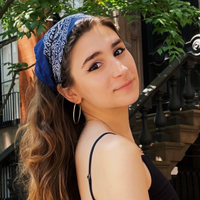
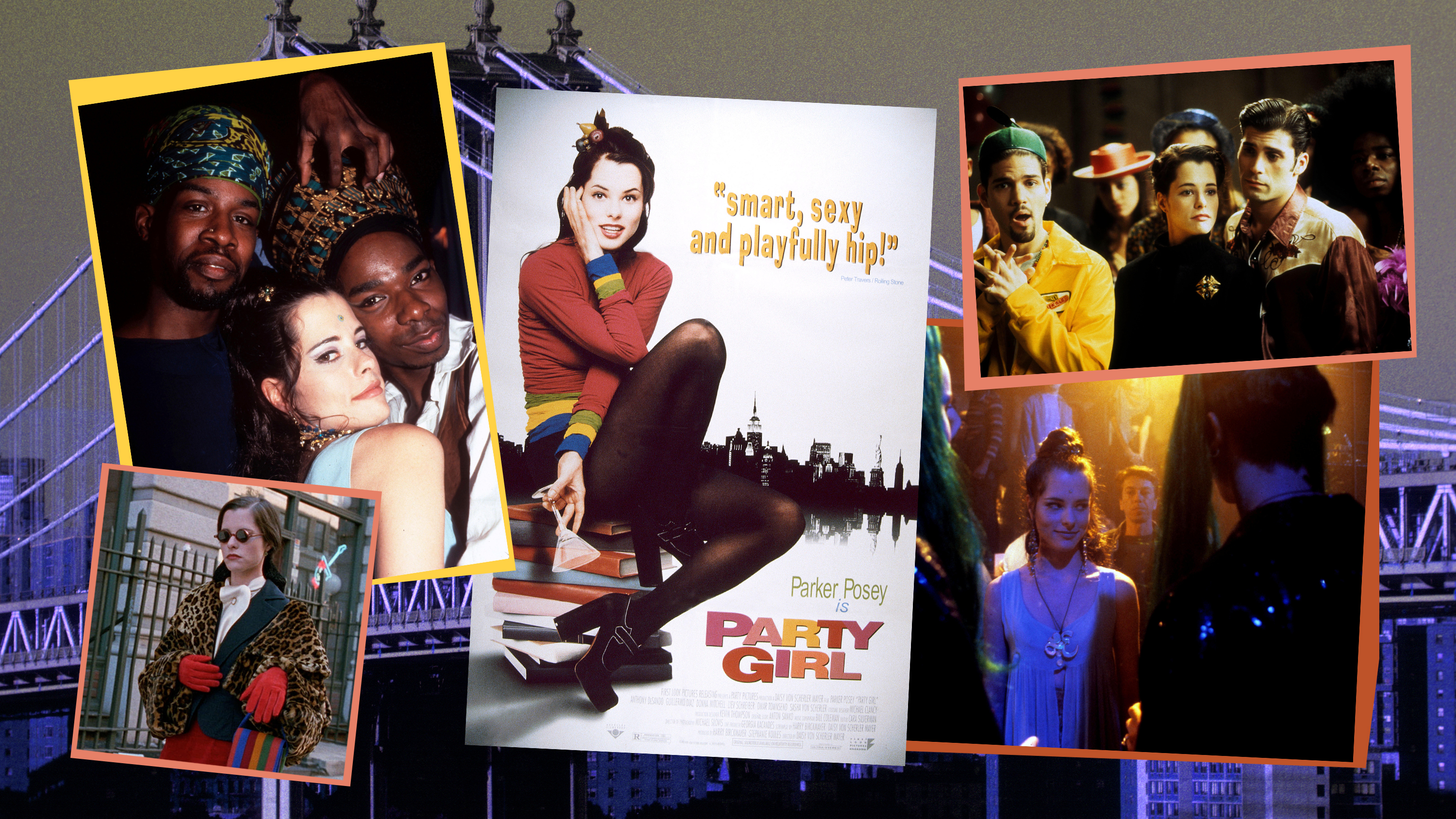
Parker Posey bursts onto the screen in the 1995 film Party Girl like the queen of the downtown scene. Dressed in a red satin Vivienne Westwood corset and bedazzled hot pants, her character Mary is being escorted out of her Lower East Side apartment by two police officers for throwing a rave. She's nonchalant, flippant, and absolutely fabulous.
But she’s also obnoxious.
Daisy von Scherler Mayer’s humble indie comedy—made against a crowd-funded budget of just $150,000—has been a cult classic since it was released on June 9, 1995. And after 30 years, Party Girl remains the standard for capturing Manhattan nightlife culture, from its wardrobe (which mixed funky vintage pieces with contemporary designers like Jean Paul Gaultier) to its soundtrack (featuring Deee-Lite and Run-DMC). But one of its most underrated and often forgotten merits is how deftly the film centers its story around an “unlikable female character,” one that didn’t gain Hollywood traction until decades later.
In recent years, audiences have become accustomed to seeing (and relating to) complicated female storylines centered on morally grey characters or women who fail more often than they succeed. Think: Hit TV comedies like Girls and Fleabag to surprise blockbusters like Bottoms. But for all the cultural clout the film has, we never give Mary her flowers for being a trailblazing precursor to the Hannah Horvaths. After Mary’s godmother (played by von Scherler Mayer’s own mother Sasha von Scherler) bails her out, she forces Mary to get a job alongside her at the library. And until the party fiend realizes her passion for bookkeeping, she’s selfish, entitled, and oblivious. She particularly lacks awareness when it comes to the Lebanese falafel cart guy, Mustafa (Omar Townsend), whom she tries to impress by “learning” Arabic and frequently complains to about having to get a job while he mourns having been a teacher in his home country.
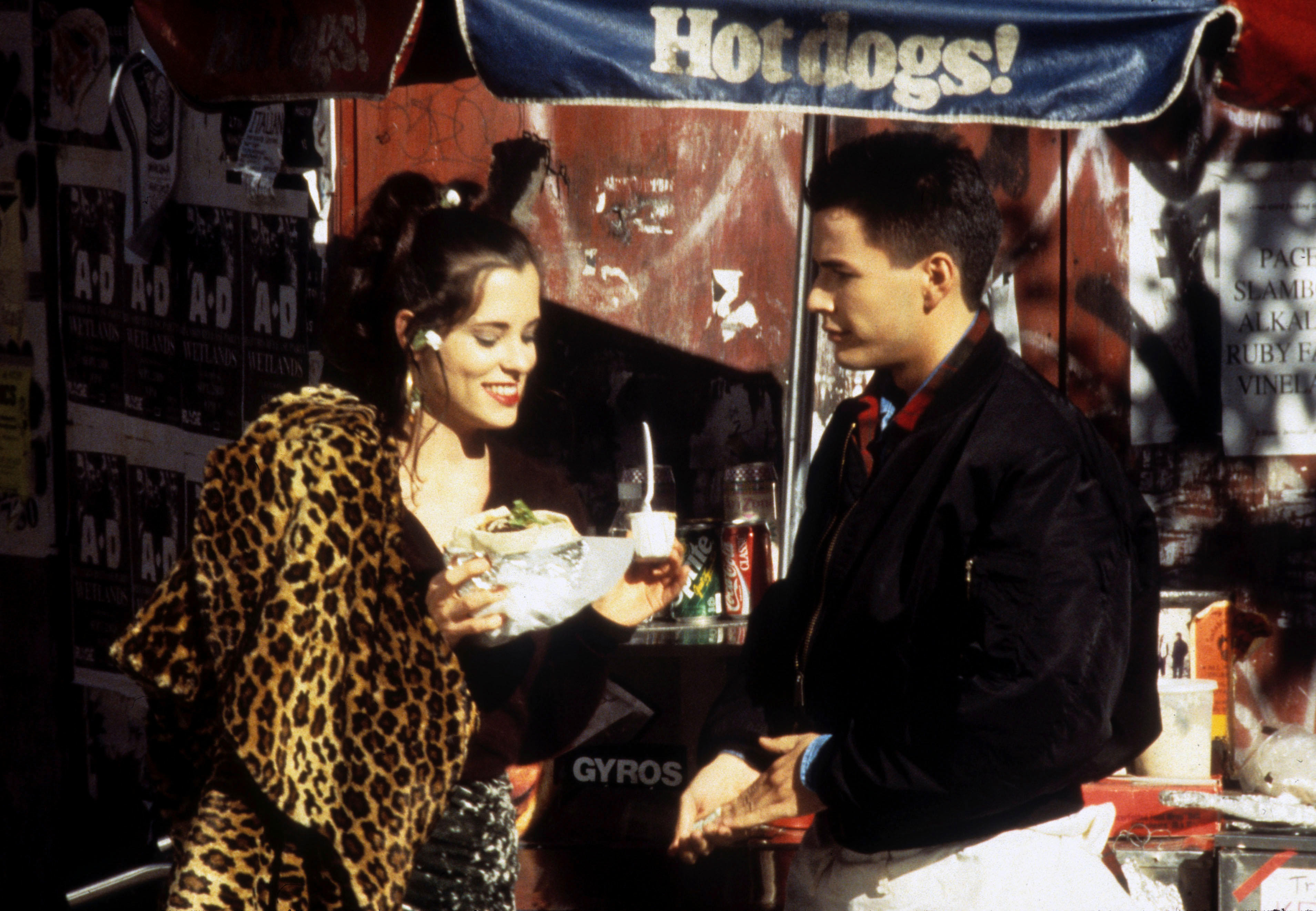
Mary (Parker Posey) buys her order of "falafel with hot sauce, a side order of Baba Ghanoush, and a seltzer" from Mustafa (Omar Townsend).
Von Scherler Mayer (whose recent credits include directing TV shows like Yellowjackets and Inventing Anna) and her co-writer Harry Birckmayer set out to make a film about a complex woman, finding comedy in her unlikability, and basing her journey on finding a passion. “A lot of times, Harry and I talked about wanting Party Girl to be a movie that's all the three-line characters from other movies—not protagonists that are so perfect and pretty and in the middle,” the filmmaker tells Marie Claire over Zoom in May.
Posey, who was still undiscovered when cast in the role and had yet to be dubbed “Queen of the Indies,” understood the pair’s vision. “I watched old movies as a kid. I’m now thinking of Twentieth Century with Carole Lombard and John Barrymore—they looked like they had so much fun acting with each other—and the parts for women back then (if they weren’t carrying the films) were well-matched to their co-stars,” the actress tells Marie Claire over email. “Daisy pitched Party Girl in this way, as a throwback to those screwball comedies…I liked the script for the wit and style. I simply knew I was the one to play the part.”
With Party Girl celebrating its 30th anniversary, von Scherler Mayer reflected on what made Mary both an homage and ahead of her time and the pushback she received for writing her the way she did.
Get exclusive access to fashion and beauty trends, hot-off-the-press celebrity news, and more.
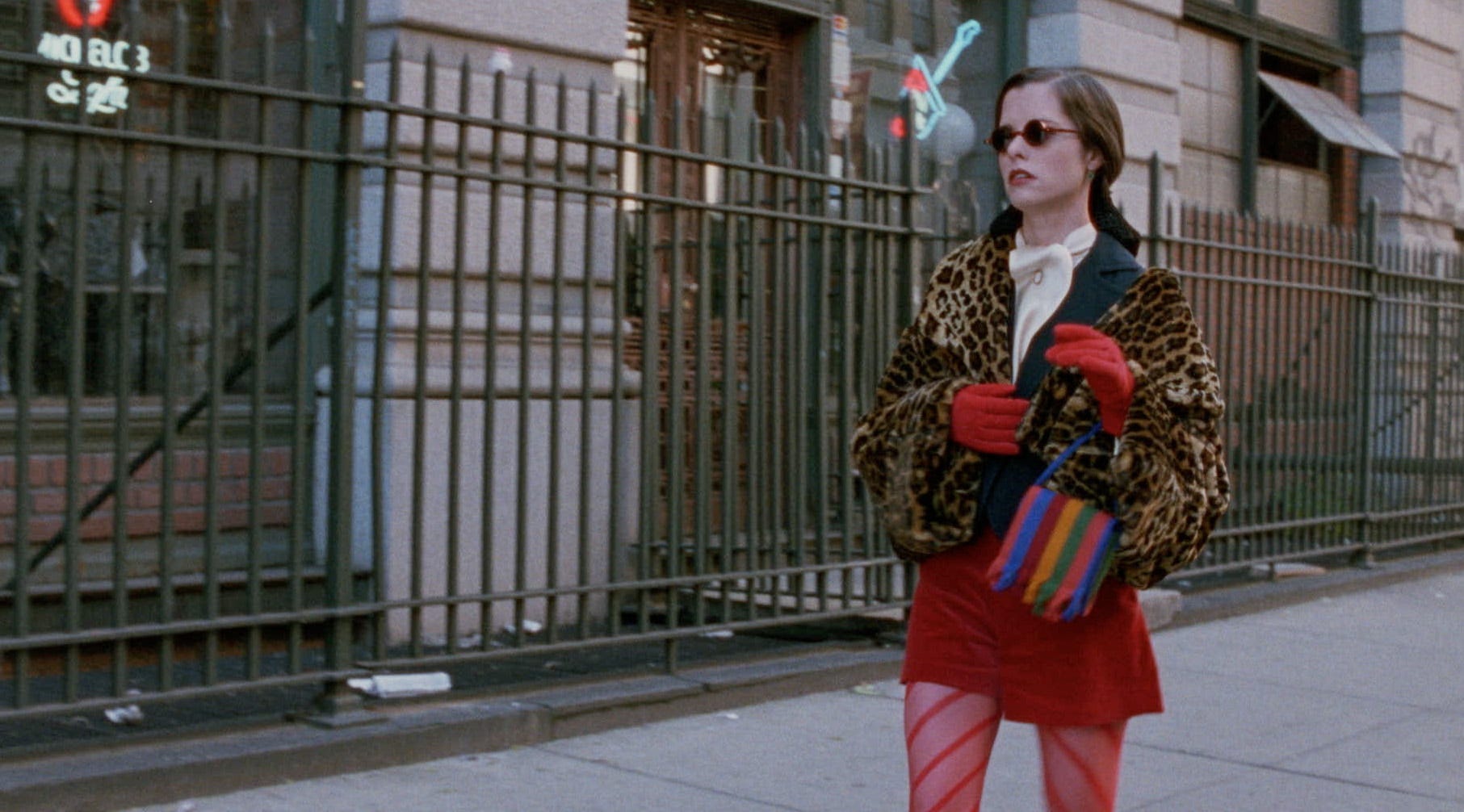
"We shot in film in 22 or 23 days. I was working a lot in my 20s on these independent movies. They required so much energy and focus on everyone’s part," Posey tells Marie Claire over email. "I loved working that way. It was punk. No one got paid, and we did it for the fun of it."
Marie Claire: You’ve called Mary a “teflon heroine.” What does that mean, and what did it mean for Mary?
Daisy von Scherler Mayer: She's ahead of her time because she's also a throwback...She's really in the vein of those Barbara Stanwyck characters like [Jean from] The Lady Eve. Generally, those teflon heroines, water just flies off them. It doesn't soak in. They tend to be selfish. They're resourceful, so they've got skills, and they're smart, and usually, they're taking advantage of a very straight-laced, sincere, good guy, who then they end up falling in love with.
And then we had a lot of other things. We wanted to talk about libraries and women's work, and having the relationship to work be the more important storyline, and letting the boyfriend part be the B story. So often in movies about women it's the opposite.
MC: Did you feel like those kinds of complicated, unlikable women were missing from the screen at the time?
DVSM: Definitely. It was a great time for romantic comedies, and I will never knock While You Were Sleeping or When Harry Met Sally…. Those were wonderful movies, but those women are not unlikable. They’re super likable.
MC: When you were trying to get the movie off the ground, was anyone pushing back to make Mary more likable or about anything else?
DVSM: Everyone was. Everyone was [pushing back] about anything in the movie that had a hard edge to it. We were told to make Mustafa Spanish or Italian. We were told to make it not New York, but Chicago. We were told that the librarian character was way too unlikable. I get that she was too much of a stereotypical hardass, but I knew I was going to cast my mom. We would say, ‘Yeah, she's hard on the page. That's because you have to meet my mom. She's super lovable and super sweet and has a very warm vibe to her.’
I went to Wesleyan and was in the film department and theater department, and Harry was a film major, so we had some pretty connected friends working at places like HBO—somebody was dating an agent. We got it out there to people, and they all rejected it for all of those reasons that would've brought it to the middle, that would've doused it down—especially her character and her character being unlikeable. 100 percent.
We ended up raising money with donations and shot it for $150,000. We never would've been able to do those choices if we hadn't done it ourselves.
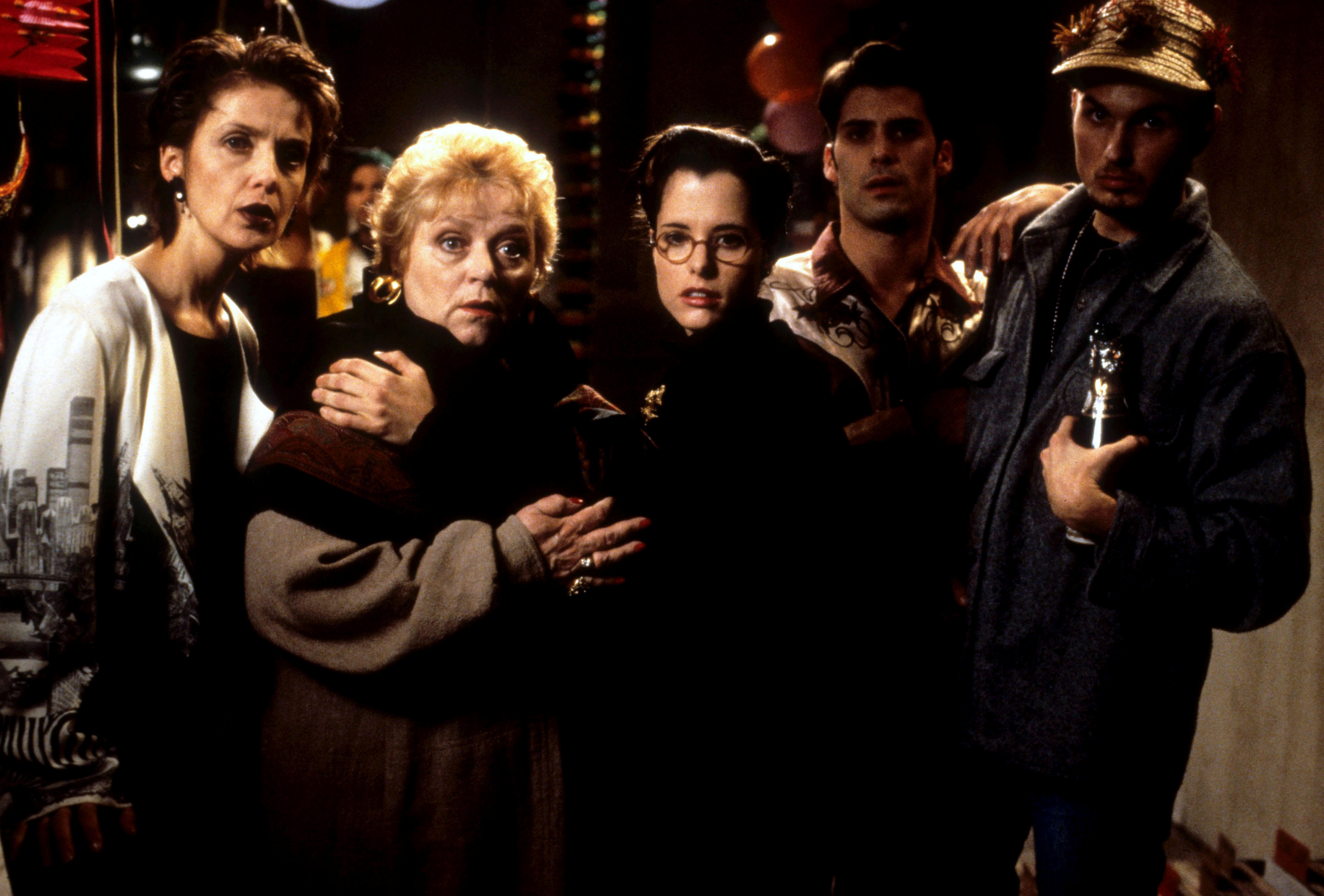
Some of von Scherler Mayer's fondest memories are working with her mother Sasha von Scherler, who played Judy, on the film.
MC: In many ways, Mary feels decades ahead of the rise of the “unlikable female lead.”
DSVM: Letterbox had me do a thing where we read reviews, and so many of the kids were saying [the film has] cultural appropriation, orientalism. Guys, the movie is not racist. The character is racist. When Mary does a fake belly dance and fantasizes about Mustafa and puts him in this Middle Eastern shirtless fantasy world, it's her reductive lusty perspective. We tracked that through the whole movie. I think it's important to separate the character's point of view from the filmmaker's point of view.
The scene that I always think is my favorite in terms of her character is when she's in the empty falafel garage. She's crying to this immigrant who hauled his butt to America. He's trying to get a job—literally, the metaphor for him is Sisyphus pushing his falafel cart up the hill. She's wearing Gaultier leather pants, head-to-toe designer, doesn't work for a living, and she's crying, and he's consoling her. That's the epitome, I think, of her selfishness. But if we don't want her to change, there really isn't a movie.
She's wearing Gaultier leather pants, head-to-toe designer, doesn't work for a living, and she's crying, and he's consoling her. That's the epitome, I think, of her selfishness. But if we don't want her to change, there really isn't a movie.
MC: It’s like she walked so Hannah Horvath on Girls could run. What did you think of Girls when it debuted?
DSVM: What is very similar to both characters is their lack of self-awareness about their own flaws. I had a hard time with Hannah when I first was introduced to Girls. I just thought, Oh, no, this is a terrible role model for these girls. Mary is certainly not a good role model because she's selfish and has all sorts of negative characteristics, but she learns her lesson. Watching Girls now with my older daughters, it's less shocking, and I appreciate the irony that I feel like a lot of women have when they watch it.
MC: Do you feel like since you created the film, it's become more normal to see unlikeable female characters on screen? Are you excited about that?
DSVM: Yes, absolutely! More flawed female characters is, in my opinion, a big win in our representation. Whether it's Phoebe Waller-Bridge in Fleabag, Mia Goth in the X series, or Cate Blanchett in, well, everything, the trend towards "unlikeable" women in the last 10 years especially means finally portraying women as three-dimensional. But more and more we've been seeing women leads who are interesting in their own right. Rachel Sennott took the baton from Lena Dunham with Shiva Baby and Bottoms. In the comedy world and in dramas and genre movies, there are refreshingly selfish, greedy, or cruel women who are also sympathetic, and that seesaw between hateful and relatable—like Parker recently in White Lotus—I think is an exciting progression.
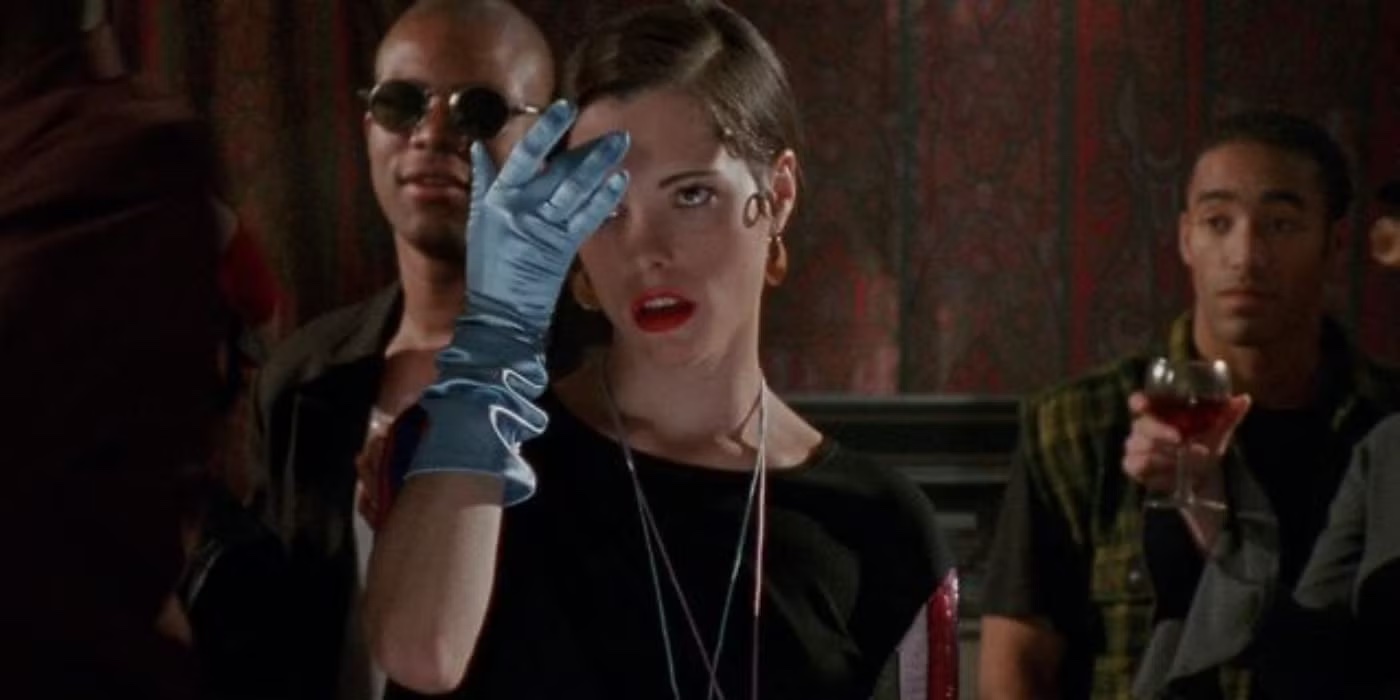
"I simply knew I was the one to play the part," Posey says.
MC: In addition to making Mary a bit more complicated, you also mentioned wanting to make a movie about a woman’s relationship with her work. What was the genesis of that? Were you frustrated by what you were seeing at the time?
DVSM: I mean, I'm still so frustrated. Come on, what the heck? I'm 58-years-old. The plot of almost every movie I see to this day, the women are the prize. It doesn't matter what the movie is. I just want to find some movies where the woman is not a prize you get or don't get at the end. All these movies where men go on a journey and they have lots of things happen to them—Matt Damon’s on Mars and he’s figuring out how to plant a potato!
It's been so long, and it's so frustrating. So, to me, it was just the basic thing of, This is going to be the story of a woman finding her passion, a woman finding a job that's good for her.
And then those iconic stereotypes of the librarian versus party girl. My favorite is a moment in It’s a Wonderful Life where they say, ‘Where's Mary?’ and she's at the library and it's like, ‘Oh, my God, she's a spinster!’ The library represents all these things, which are so far from the fabulous people of the library.
MC: Was Parker Posey always Mary? Or did she understand something about the character that maybe other people didn’t?
DVSM: First off, I want to say what an incredibly thoughtful and nuanced actor Parker is. Her charisma is so off the charts that sometimes people don't appreciate how much process she has. Even as a very young woman in this role, you should have seen her legal pads of notes, her script notes, her input. We would butt heads when she wanted to improv and I didn't want her to improv, and then she did improv, and of course it's great, and it's in the movie.
But it wasn't always her. We were doing a traditional casting process. The casting director, Laura Rosenthal—who's wonderful and worked with another woman, Caroline Sinclair—said, ‘This girl comes into my office and I feel like she is the part. You have to meet her.’ She was known among casting people and definitely auditioning at a certain high level, but she was too much her.
Sometimes I think, How can I explain how much I feel Party Girl owes to Parker? I think of movies like One Flew Over the Cuckoo's Nest. Could that movie exist without Jack Nicholson? I can't imagine that movie with another actor. I feel that way about Parker. She called me after she read the script, and she was like, ‘I have 80 pairs of shoes. I want to play this part. I should play this part.’
When she came in, we were at the Naked Angels theater space, which had big, heavy velvet curtains, and she auditioned just for myself, Harry, Stephanie [Koules], who was our producer. She walks out and she wore those John Fluevog shoes that are in the movie, and she's like, click, click, click. As she's walking away, we didn't want to start cheering and clapping, but we all silently raised our hands because we knew we had found Mary. It was incredible kismet that she found us and we found her.
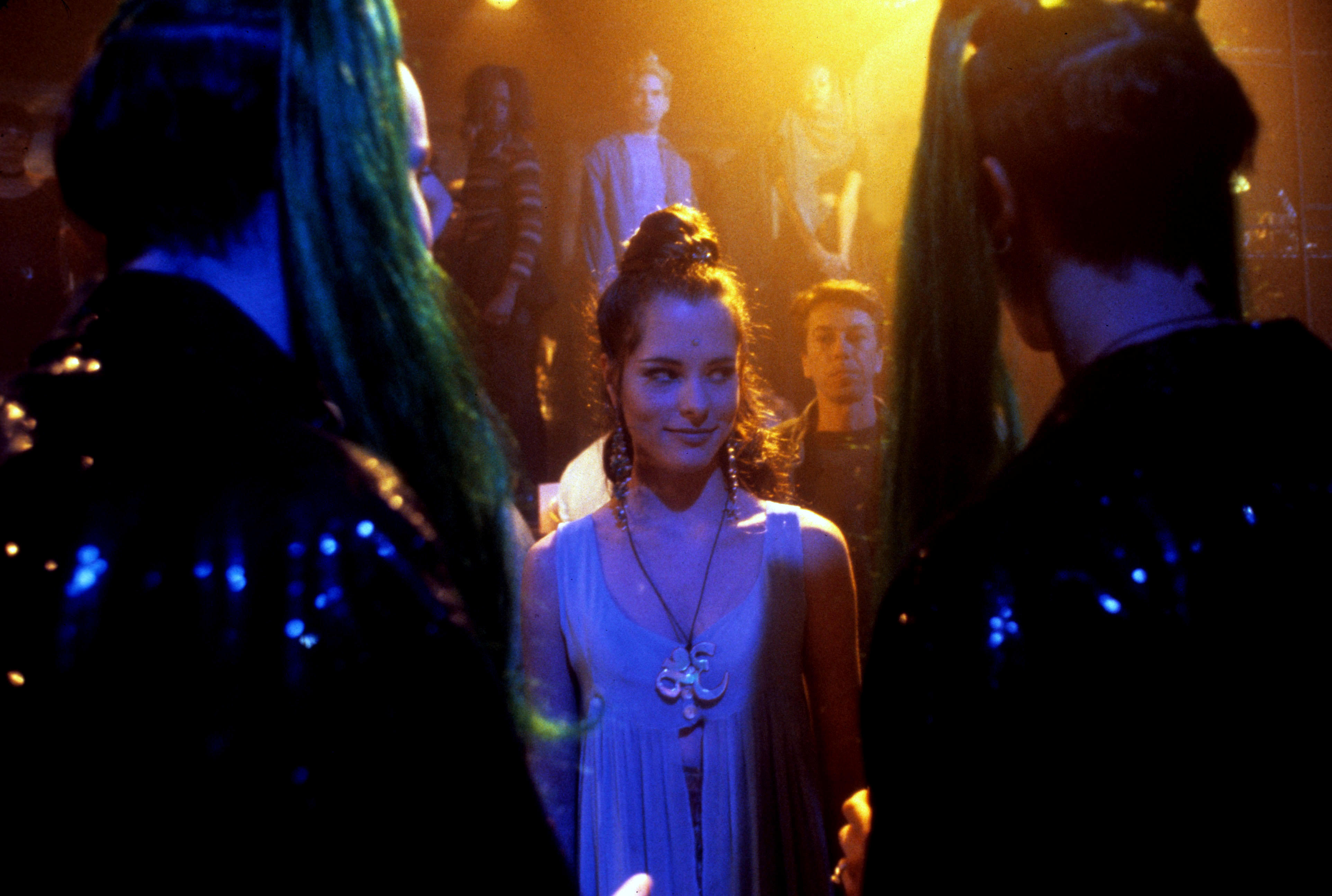
A party scene in which Mary wears culturally appropriative clothing.
MC: Was there anything that you took out of the screenplay or the final cut that you regretted?
DVSM: It took us a long time to write it. It's such a thin, little sliver of fun, but honestly, we rewrote and rewrote. It was definitely a labor of love. A big regret [is a scene we] took out for financial reasons. We had these super fun flashbacks to Party Girl’s Mom. You know how [her godmother Judy] always says, ‘Your mother was a woman with no common sense?’ and [Party Girl] says her mother died in a DUI, and that's why she only takes public transportation, why she doesn't drink, why she doesn't drive. We took out those flashbacks, but they were in the ‘70s, and we were in the point of view of Young Mary. She's dodging cigarettes. She's at cigarette height, and all these cigarettes are going to get her. She's going through this crowd, and everybody's head to toe ‘70s.
It's why the movie's only 89 minutes. We took out a lot in order to pay for it. Initially, we had competing Middle Eastern restaurants, and then someone smart said, ‘Are you guys serious? Do you think you're going to buy out restaurants on your budget?’ And so that made them falafel carts, which is much more cinematic. I always find that whenever I do a rewrite, even in working as a television director, when you do that rewrite to scale down the budget, you end up getting to the essence of what's fun about what you're writing. But I still miss Party Girl's Mom. She was based on a distant relative of Harry's who was also one of the inspirations for Absolutely Fabulous.
To me, it's not that 'Party Girl' is ahead of its time. It’s that Hollywood is really lame.
MC: All of those distributors missed out on a movie that became a cult classic. While you were making it, did you feel like you were making something ahead of its time or foresee its legacy in any way?
DVSM: No, I don't understand why everything isn't like this. To me, it's not that Party Girl is ahead of its time. It’s that Hollywood is really lame. Let's reverse engineer what we're talking about. Turn your lens on the world around you and start including it, because what we have is an entertainment culture that comes from other movies.
People [talk about the film’s] diversity. That was not diversity. That was New York City. There are falafel vendors and DJs, and everybody has different ethnic backgrounds. I had a bus pass. I grew up in the city. My schools were not all white.
I know that [Party Girl has] really affected a lot of people who feel other-ish, who come up to me on set [while I’m directing today] and say, ‘I saw your movie. It made me feel like I wanted to move to the city, and I wanted to pursue things and be around a different group of people or not feel limited in my world.
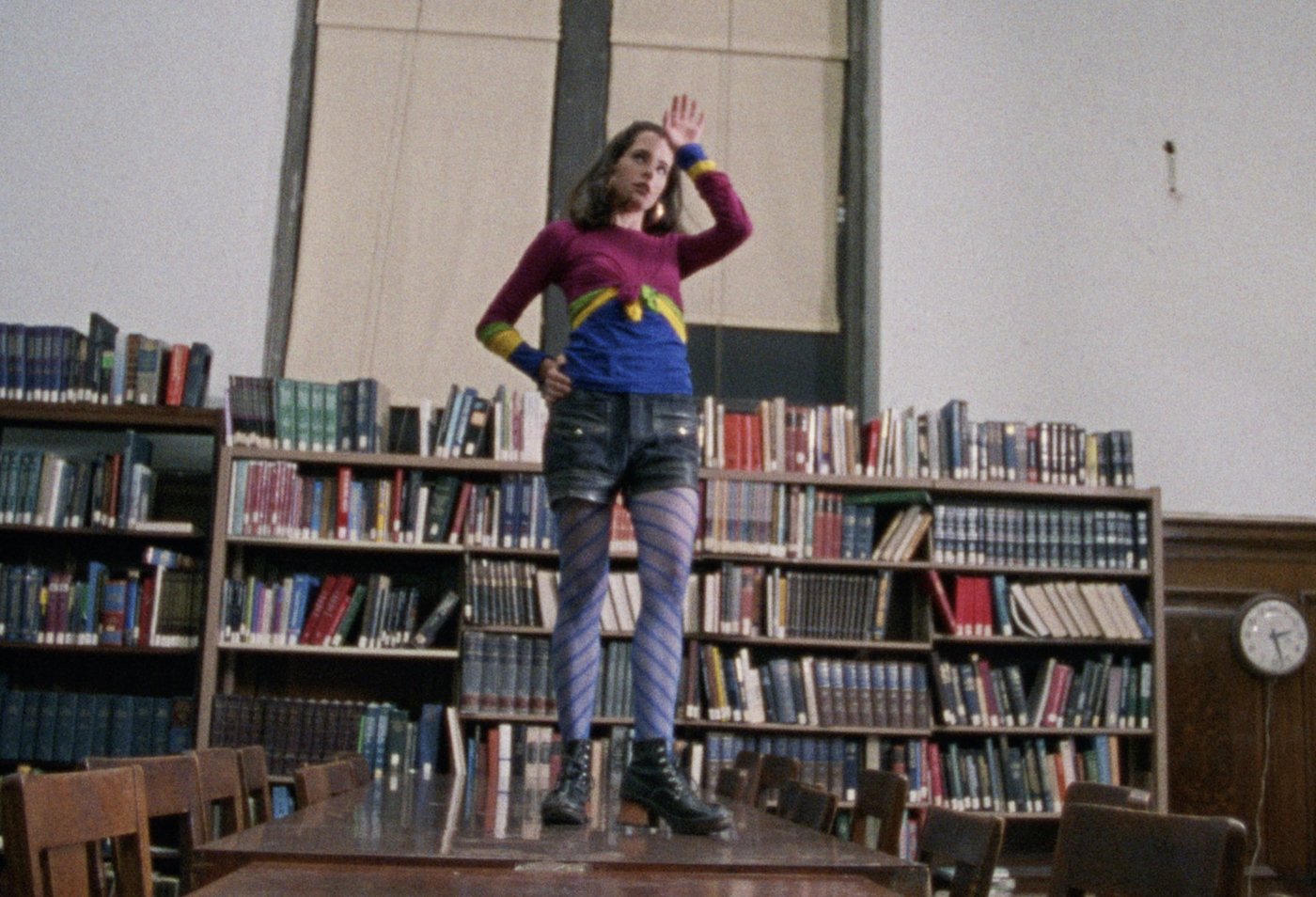
Von Scherler Mayer explains it was important that Party Girl was primarily about Mary finding a job and passion, rather than a love interest.
MC: You stuck to your guns while writing and producing the film, but when it came to selling it to a distributor, did you face any challenges? Did they request a lot of cuts?
DVSM: They all rejected it. God knows they would've! Sony was considering it, but wanted us to reshoot. They wanted more extras at the final party, but there was a particular shot in which I thought it would be cool if there were nobody on that side of the room. It's not cool. It looks like a mistake. But I was also 28-years-old, give me a break!
This lovely Australian company called First Look was the one who bought it. They were the ones who put the money into completing it, but then, even to promote it, they didn't have the strength to get it into a gazillion theaters. So, it was the first movie to ever go on the internet. Apparently, that was going to be the movie Hackers. They were so mad because their whole movie was about computers, and we scooped them and made it into the history books as the first movie on the internet.
At Sundance, we'd already sold it to First Look. But Parker, such a smart woman, she knew Sundance was a job. She had a stylist. She came up with the most outlandish outfits and every day she had a team working on her as if she was famous. These people were not getting paid. All of that happens now at a high level, but for such a young woman to know, I'm going to make sure that we get all the press. And we did. We got a lot of press from that, but still, the movie didn't get a huge release. The fact that it stayed in the zeitgeist all this long is amazing.
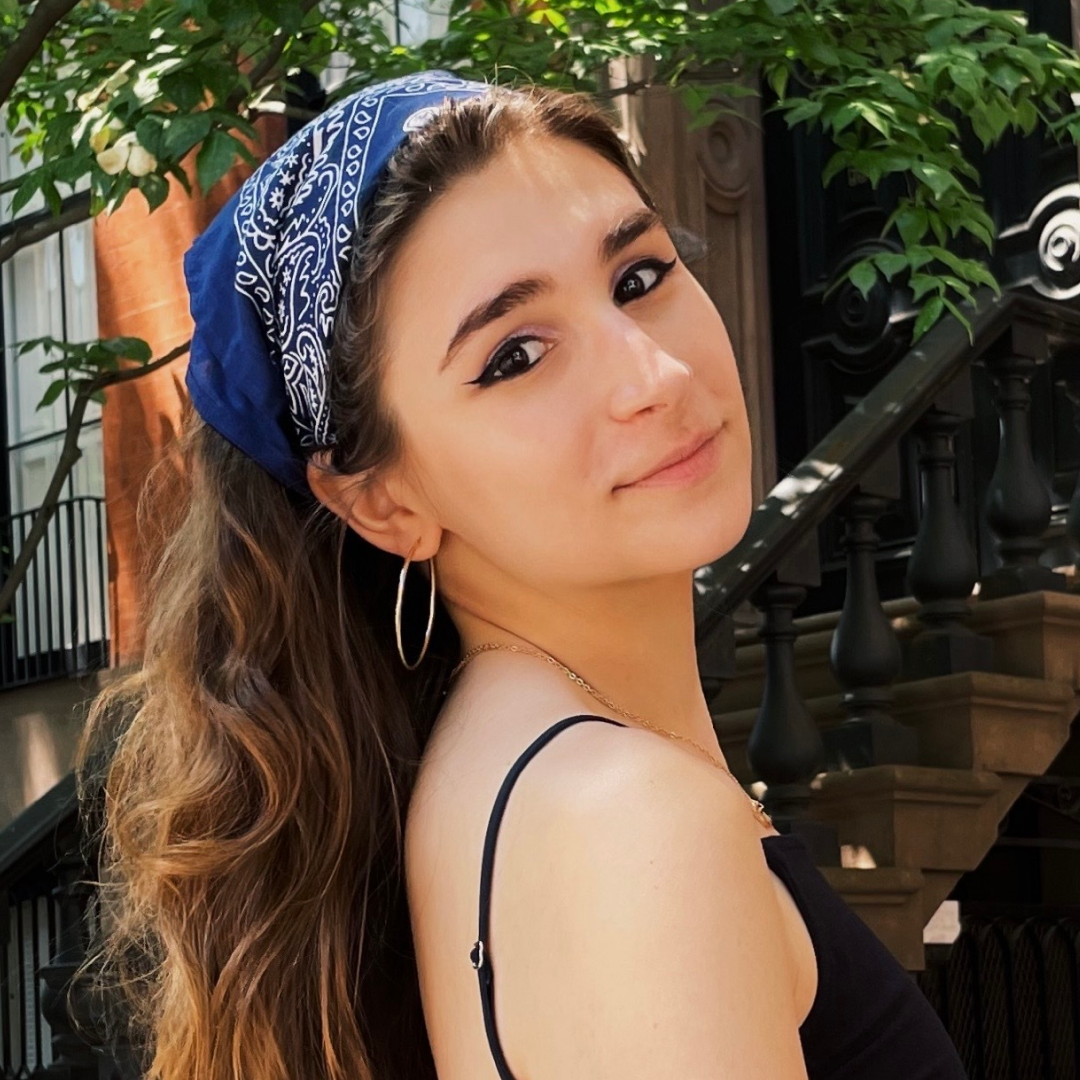
Sadie Bell is the Senior Culture Editor at Marie Claire, where she edits, writes, and helps to ideate stories across movies, TV, books, music, and theater, from interviews with talent to pop culture features and trend stories. She has a passion for uplifting rising stars, and a special interest in cult-classic movies, emerging arts scenes, and music. She has over nine years of experience covering pop culture and her byline has appeared in Billboard, Interview Magazine, NYLON, PEOPLE, Rolling Stone, Thrillist and other outlets.